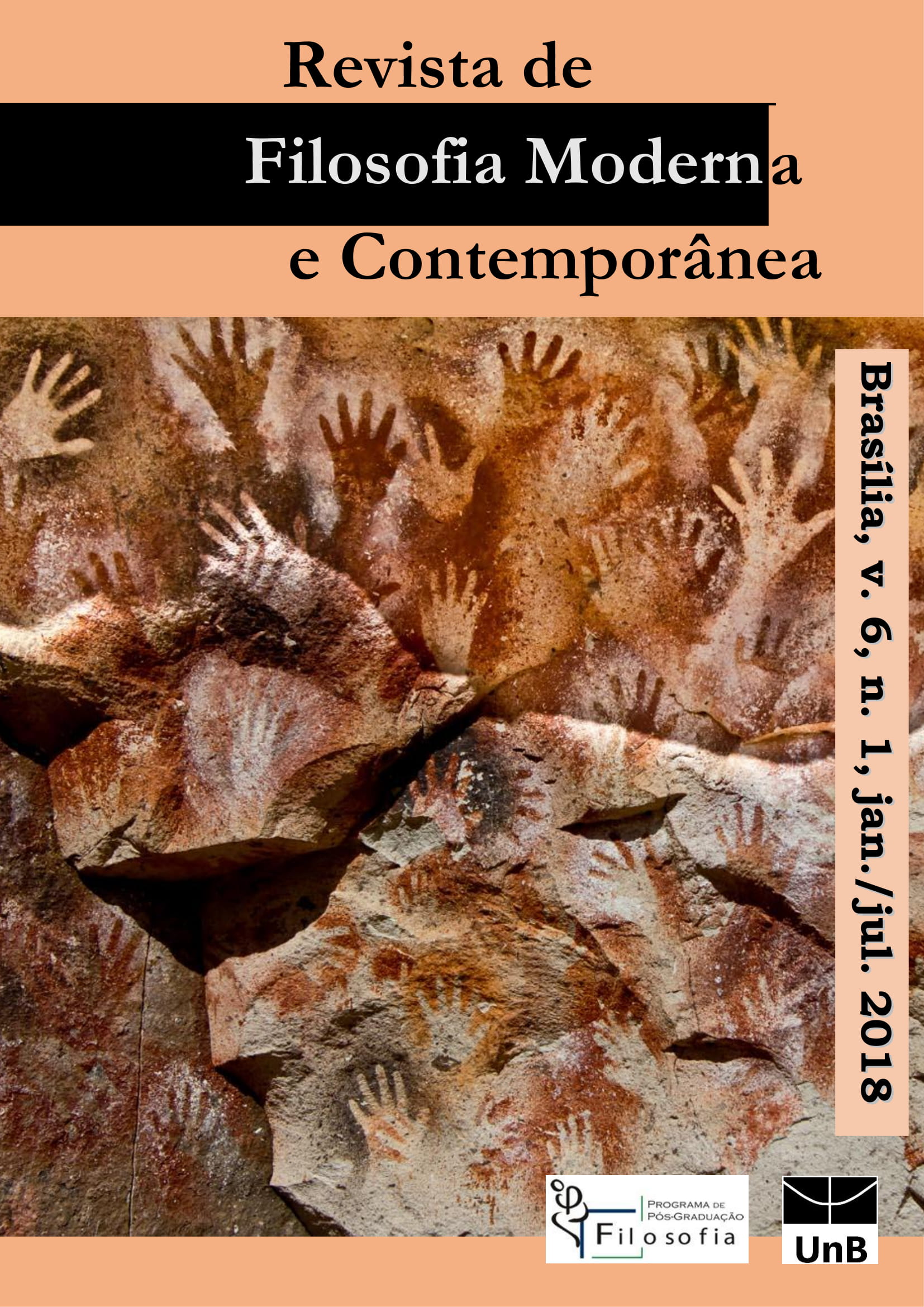Sistemas de Herança: As Múltiplas Dimensões da Evolução
DOI:
https://doi.org/10.26512/rfmc.v6i1.20238Palavras-chave:
Teoria Moderna da Evolução. Síntese Evolutiva Estendida. Determinismo Genético.Teoria da Dupla Herança.Resumo
A teoria evolutiva unifica as Ciências Biológicas e tem sido também aplicada em diversos setores das Ciências Exatas e Humanas. Originalmente proposta por Darwin como “descendência com modificação”, ela pressupõe a existência de variação herdável que é transmitida de forma desigual para a geração seguinte. No século XX, entretanto, essa teoria adquiriu um viés fortemente genético: a evolução biológica passou a ser compreendida como um processo que modifica a composição dos genes de uma população no decorrer de gerações. Nasce aqui o determinismo genético, o qual inspirou ideias sobre sociobiologia e genes egoístas, dentre outras. Nas últimas décadas, diversos evolucionistas têm enfatizado que, além da dimensão genética, há outros sistemas de herança que também podem promover a descendência com modificação. Neste artigo serão apresentados os sistemas de herança biológica e cultural, atualmente reconhecidos pelos biólogos evolucionistas, e que têm sido explorados e divulgados pelo Prof. Paulo Abrantes como importantes fontes de variação associadas à evolução humana.
Downloads
Referências
ABRANTES, P.C. Imagens de natureza, Imagens de Ciência. Campinas: Papirus, 1998.
ABRANTES, P.C. Filosofia da Biologia. Artmed Editora, 2009.
ABRANTES, P.C. “Culture and transitions in individuality”. In: Dutra, L.H.A.; Luz, A.N. (Org.). Temas de Filosofia do Conhecimento. 1ed.Florianópolis: Núcleo de Epistemologia e Lógica da Universidade Federal de Santa Catarina, p. 395-408, 2011a.
ABRANTES, P.C. “Human evolution: Compatibilist Approaches”. In: KRAUSE, D.; VIDEIRA, A. (Org.). Brazilian Studies in Philosophy and History of Science. Dordrecht: Springer, v. 1, p. 171-183, 2011b.
ABRANTES, P.C. “Aspectos metodológicos de la teoría de la herencia dual en la evolución humana”. In: CONTRERAS, J.M.; LEÓN, A.P. (Org.). Darwin y el evolucionismo contemporáneo. 1ed.Mexico: Siglo XXI, v., p. 135-152, 2012.
ABRANTES, P.C. “Evolução humana: estudos filosóficos”. Revista de Filosofia Aurora (PUCPR. Impresso), v. 25, p. 75-105, 2013a.
ABRANTES, P.C. “Human evolution and transitions in individuality”. Contrastes, v. 18, p. 203-220, 2013b.
ABRANTES, P.C. “Natureza e Cultura”. Ciência & Ambiente, v. 48, p. 7-21, 2014a.
ABRANTES, P.C. “Linguagem e a evolução da mente humana: a perspectiva de um neurobiólogo”. Cérebro, Evolução e Linguagem. 1ed.Brasília:
Editora Universidade de Brasília, p. 23-61, 2014b.
ABRANTES, P.C. “Conflito e cooperação na evolução humana”. Ciência & Ambiente, v. 48, p. 289-301, 2014c.
ABRANTES, P. C.; ALMEIDA, F. P. L. “Evolução Humana: a teoria da dupla herança”. In: ABRANTES, P.C. (Org.). Filosofia da Biologia. 1ed.Porto Alegre: ARTMED, 2011, v. 1, p. 261-295.
ALMEIDA, F. P. L; ABRANTES, P. “A teoria da dupla herança e John Murray, 1859.
DARWIN, C.R. The expression of the emotions in man and animals. London, John Murray, 1872.
DAWKINS, R. The Selfish Gene. Oxford University Press, 1976.
FISHER, R.A. “The correlation between relatives on the supposition of Mendelian inheritance”. Transactions of the Royal Society of Edinburgh 52: 399”“433, 1918.
FISHER, R.A. The Genetical Theory of Natural Selection. Oxford: Clarendon Press, 1930.
GOULD, S.J. The Structure of Evolutionary Theory. Cambridge, MA: Harvard University Press, 2002.
HALDANE, J.B.S. “The time of action of genes, and its bearing on some evolutionary problems”. American Naturalist 66: 5”“24, 1932.
HUXLEY, J.S. Evolution: The Modern Synthesis. London: Allen & Unwin, 1942.
IRONS, W. “Genes and cultures ”“ Boyd and Richerson: the intertwined roles of genes and culture in human evolution”. Zygon 42: 347”“54. 2009.
JABLONKA, E., LAMB, M.J. Epigenetic Inheritance and Evolution. Oxford: Oxford University Press, 1995.
JABLONKA, E., LAMB, M.J. Evolution in Four Dimensions: Genetic, Epigenetic, Behavioral, and Symbolic Variation in the History of Life.
Cambridge, MA: MIT Press, 2005.
KUTSCHERA, U., NIKLAS, K.J. “The modern theory of biological evolution: An expanded synthesis”. Naturwissenschaften 91: 255”“276, 2004.
LALAND, K. “Evolution unleashed: Is evolutionary science due for a major overhaul ”“ or is talk of ‘revolution’ misguided?”. Aeon Magazine. Disponível em: https://aeon.co/essays/science-in-flux-isa-revolution-brewing-in-evolutionary-theory: acessado em 17 de Janeiro de 2018.
LEWONTIN, R.C. The triple helix: Gene, organism, and environment. MA: Harvard University Press, 2001.
LODISH, H.F. “Through the Glass Lightly”. Science Vol. 267, Issue 5204, pp. 1609, 1995.
LOSOS, J.B. The Princeton Guide to Evolution. Princeton University Press. 871p., 2017.
MAYR, E. Systematics and the Origin of Species. New York: Columbia University Press, 1942.
MAYR, E. The Growth of Biological Thought: Diversity, Evolution, and Inheritance. Harvard University Press, 1982.
MÜLLER, G.B. “EvoDevo: Extending the evolutionary synthesis”. Nature Reviews Genetics 8: 943”“949, 2007.
ODLING-SMEE, F.J., LALAND, K.N., FELDMAN, M.W. Niche Construction: The Neglected Process in Evolution. Princeton, NJ: Princeton University Press, 2003.
PENNISI, E. “Modernizing the Modern Synthesis”. Science 321: 196”“197, 2008.
PIGLIUCCI, M. “Do we need an extended evolutionary synthesis?”. Evolution 61: 2743”“2749, 2007.
PIGLIUCCI M.; MÜLLER, G.B. (Eds). Evolution: The Extended Synthesis. MIT Press, Massachusetts, 2010.
RADICK, G. “Teach students the biology of their time”. Nature, 533 (7603), pp. 293-293, 2016.
RICHERSON, P.; BOYD, R. Not by genes alone: how culture transformed human evolution. Chicago: The University of Chicago Press, 2005.
ROSE, M. R., OAKLEY, T. H. “The new biology: beyond the modern synthesis”. Biology Direct, 230, 2007.
SCHLICHTING, C.D., PIGLIUCCI, M. Phenotypic Evolution: A Reaction Norm Perspective. Sunderland, MA: Sinauer, 1998.
SIMPSON, G.G. Tempo and Mode in Evolution. New York: Columbia University Press, 1944.
SOLTIS, J.; BOYD, R. T.; RICHERSON, P. Can group-functional behaviors evolve by cultural group selection? Current Anthropology 363: 473”“94. 1995.
STEBBINS, G.L. Variation and Evolution in Plants. New York: Columbia University Press, 1950.
STERELNY, K. The representational theory of mind. Oxford: Basil Blackwell, 1990.
WADDINGTON, C.H. Evolutionary systems: Animal and human. Nature 183: 1634”“1638, 1959.
WEST-EBERHARD, M.J. Developmental Plasticity and Evolution. New York: Oxford University Press, 2003.
WHITFIELD, J. “Postmodern evolution?”. Nature 455: 281”“284, 2008.
WRIGHT, S. “The roles of mutation, inbreeding, crossbreeding and selection in evolution”. In Proceedings of the Sixth International Congress of Genetics. Vol. 1: 356”“366, 1932.
Downloads
Publicado
Como Citar
Edição
Seção
Licença
Direitos Autorais para artigos publicados nesta revista são do autor, com direitos da primeira publicação para a revista. Em virtude dos artigos aparecerem nesta revista de acesso público, os artigos são de uso gratuito, com atribuições próprias, em aplicações educacionais e não-comerciais.


